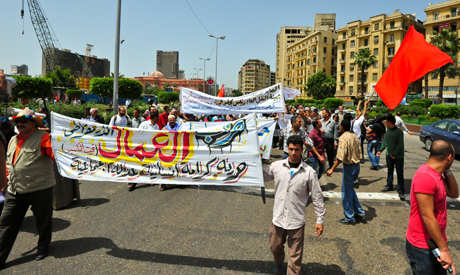workers' rights
Israel: Histadrut unmoved by Arab winds of change

Members of the Workers Democratic Party march through Tahrir Square on May Day, 2011. Photo by Mohamed El Hebeishy/ahramonline.
South Korea: Irregular and migrant workers continue their daily struggles

February 8 rally at Yonsei University by irregular cleaning staff.
By Roddy Quines
March 20, 2011 – Links International Journal of Socialist Renewal -- This is to update my article published in Links International Journal of Socialist Renewal on January 14, 2011. There are a number of victories to report. These victories show the power of diligent action and solidarity in overcoming injustice. They also serve as evidence that direct action is an effective way to get results. There are some new struggles to report, and hopefully these struggles can also generate positive results. The struggles in this article are just a few of the many across the country being fought by “irregular” workers.
The European workers' movement: dangers and challenges

In Portugal, November 2010 general strike called by the Communist Party-led CGTP and the
United States: New workers' movement at the crossroads
By Dan La Botz
United States: The new American workers' movement and the confrontation to come

Protesters fill the Rotunda at the state capitol building on February 16, 2010, in Madison, Wisconsin.
By Dan La Botz
February 28, 2011 -- Solidarity Webzine -- The new US workers' movement—born in the last few weeks in the giant protests in Wisconsin and Ohio—faces a fateful confrontation. In Madison and Columbus, Republican legislators are pushing to abolish public employee labour unions and tens of thousands of workers are protesting and resisting. We have seen nothing like this face-off between workers and bosses in the United States since the labour upheaval of the early 1970s, though the issues in the balance are more like those of the 1930s. The very existence of the US labour movement is at stake. The question is: What will it take to win?
New book reveals the history of rubber: holocausts, environmental destruction and class struggle

The Devil’s Milk: A social history of rubber
By John Tully
Monthly Review Press, 2011
[Order the The Devil’s Milk from Monthly Review Press HERE. John Tully launched the book in Melbourne on February 17, at Readings Books, Carlton (309 Lygon St). He will also launch it in New York City on February 22, 7.30pm, at The Brecht Forum, 451 West Street.]
February 18, 2011 – Links International Journal of Socialist Renewal -- This new book from Monthly Review Press – by Australian socialist John Tully -- documents the history of rubber and the role it has played in the development of capitalism.
Rubber is an essential industrial material, although underappreciated by most of us, even though we are surrounded by it. Since its industrial uses began to be fully appreciated in the 1800s, the quest for rubber has been, in Tully’s words, “a paradigm of imperialism”.
Egypt: Much more than a `Facebook revolution'

February 18, 2011 – There has been much written in the main

The US Navy counts on the Suez canal for rapid deployment of vessels from the Mediterranean to the Persian Gulf.
[For background to Egypt's working-class movement see also "Egypt: Historian Joel Beinin on the role of the labour movement" and "Egypt: Workers hold key to uprising".]
* * *
Kamal Abbas, director of the Center for Trade Union and Workers Services, interviewed by Jane Slaughter
February 9, 2011 -- Labor Notes -- Though all eyes are on Cairo and its Liberation Square, few could know that Egyptian workers have been protesting and striking in huge numbers for years.
[For background to Egypt's working-class movement see also "Egypt: Historian Joel Beinin on the role of the labour movement" and "Egypt: Workers hold key to uprising".]
Egypt: Historian Joel Beinin on the role of the labour movement; Democracy Now! interview
February 10, 2011 -- Democracy Now! -- Egypt’s pro-democracy uprising is surging after striking workers joined
in the protests nationwide. Thousands of Egyptian workers walked off the
job February 9 demanding better wages and benefits. Strikes were
reported in Cairo, Alexandria, Luxor and the Suez Canal. We speak to
Stanford University Professor Joel Beinin, who, as the former director
of Middle East Studies at the American University in Cairo, has closely
studied the Egyptian labour movement for years. “This is huge, because
there has been for the last 10 years an enormous wave of labour protests
in Egypt”, Beinin says. “In the last few days what you’ve seen is tens
of thousands of workers linking their economic demands to the political
demand that the Mubarak regime step aside.” Click HERE for the program transcript. Intervew continues HERE.
* * *
Egypt: Workers hold key to uprising

Pro-democracy protesters confront police in Suez.
By Jeff Kaye
January 31, 2011 -- MyFDL -- While much analysis has focused on the youth-social network driven aspects of the recent uprising in Egypt, or on diplomatic and political maneuvers that thus far have left President Mubarak in office, and given even more power to the state repressive apparatus through the appointment of intelligence chief Omar Suleiman to the vice-presidency, it is the Egyptian working class that holds the future of its country in its hands.
The organised workers' movement saw its unions gutted by state privatisation and the gutting of union independence though the hated Law No. 100, which guaranteed that union representation would be strongly controlled by the state. However, recent events, particularly in strategic Suez, have shown that when the social weight of the workers is thrown into the balance, even all the machinations of Hillary Clinton’s State Department will not be able to patch together Mubarak’s state apparatus. The question then will be, what will follow it?
